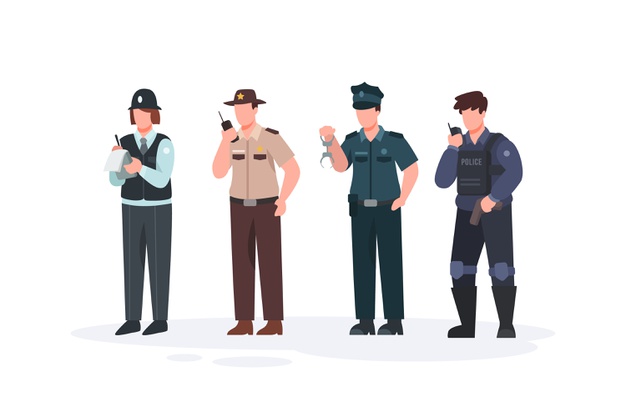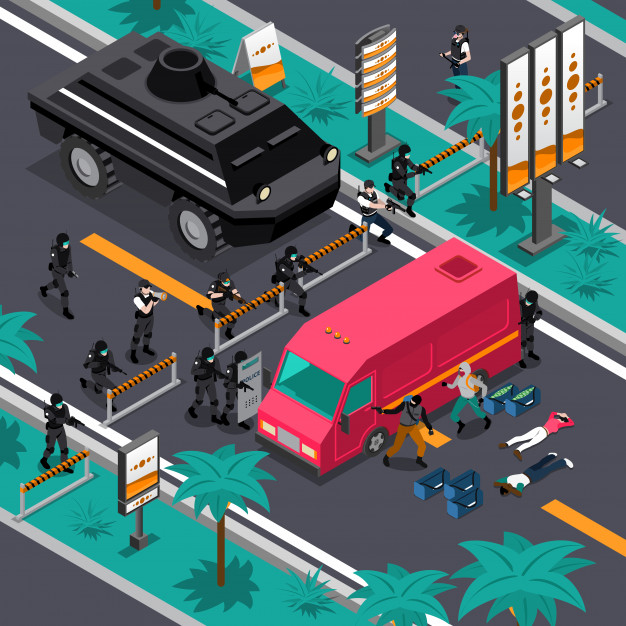Community policing is an important strategy of not only dealing with crime but helping forge relationships between law enforcement officers and the communities within which they serve. The establishment of these relationships under the community policing umbrella helps the police to better understand the communities they serve and gain their trust. Law enforcement officers can then leverage the relationships they build to gain information that helps them prevent as well as solve crimes. However, community law enforcement officers face a lot of challenges as they dispatch their duties.
Suspicion and Mistrust

Perhaps one of the most common challenges for community law enforcement officers is suspicion and mistrust. The conduct of some police officers has led whole communities to pull away from law enforcement. The people do not trust law enforcement and are suspicious of what they will do with the information they might gather from the community,
In addition, if the police do not have a clear mandate and do not do everything that they can to reach out to the communities they serve, that often fosters feelings of mistrust and suspicion because people do not know why the police are there.
Budgetary Constraints

Many parts of the world have been reducing the budget available to law enforcement for years now. This often happens when countries find areas where they can use the money instead of increasing the budgets for their law enforcement officers.
When budgets get strained, the first area that often suffers is community policing. The irony is that with the number of law enforcement officers used in community living reduced, crime is likely to spike, meaning that these areas will end up needing more law enforcement officers than they would have if the law enforcement officers did not leave in the first place.
Additionally, the social and economic impact of the spike in crime might take some time to reverse and cost a local government more than what it would have cost them to keep the community law enforcement officers in place.
Centralised Decision-making

A hierarchical structure is very important to law enforcement. It is this hierarchical structure that keeps law enforcement on its feet. However, a centralised system of decision-making is a massive challenge for community law enforcement officers. Since information has to be passed from the officers on the ground to someone who can make the call and is often higher in the chain of common, decisions are made slowly.
The minutes that are wasted can be the difference between life and death. This is why the decentralisation of decision-making in law enforcement is crucial, especially in cases where officers need to make decisions quickly under new and unknown circumstances and in unusual circumstances such as during the COVID-19 pandemic.
There are many other challenges that the COVID-19 pandemic gives law enforcement officers. Wilfrid Laurier University has an in-depth guide that explains the different challenges law enforcement officers are facing and some of the solutions proposed to help them out. You can click here to read it.
In these situations where decisions have to be made quickly, law enforcement officers have to be given the autonomy to make day-to-day decisions and take the necessary risks to solve a problem and precautions to protect themselves.
Interference

Many law enforcement officers want to serve their communities to the best of their abilities. They want to integrate themselves with the members of these communities, get to know them and become part of these communities. However, that is often not possible because law enforcement officers are moved from certain areas due to several reasons. By moving law enforcement officers around like this, they are not given enough time to have an impact in the community which means their presence there is not beneficial to anyone.
Ethical Dilemmas

Most community law enforcement officers live in the communities they work in. This often leads to conflicts and ethical dilemmas. For example, will the police officer arrest people they know from their community when they are off duty? Will they use necessary force when confronted with a threatening situation when serving the people that they know so well? If they do, how will they use it?
Combating the Drug Pandemic

Some parts of Canada are experiencing a drug pandemic right now. Drug use in these areas is so rampant that the ideal solution is to open drug distribution clinics where addicts can get drugs in a safe environment. Although this is a real solution that has had some tangible effects on the fight against the drug pandemic, a lot more still needs to be done.
One of these is the prevention of crime by law enforcement officers. The only problem is that it is impossible to arrest everyone who uses drugs. In any case, arresting them would leave those who are selling the drugs on the streets.
For local enforcement officers, fighting the drug pandemic without putting everyone in jail is a challenge that needs the police to work together with the communities they serve to come up with and implement creative solutions such as those discussed above.
Inadequate Manpower

Depending on the communities they serve, law enforcement officers might need to work together with a large number of law enforcement officers. Unfortunately, community law enforcement officers often find out there are not enough law enforcement officers to go around.
This means there are too few officers to serve a particular area, and the community policing initiatives that have been put in place have little chance of success.
Inadequate manpower does not only mean raw numbers, but also expertise. Community policing is a lot more sensitive than traditional policing, meaning that all the police officers involved should have adequate training if the police department wants to see good results.
Unfortunately, some community law enforcement officers do not have adequate training to adequately deal with and address the issues found in the communities they should be serving.
Challenges Caused by Technology

Technology has always been a welcome addition to policing. We all understand that ensuring all law enforcement officers wear body cams and use other devices that allow for the easy collection of evidence makes law enforcement more transparent. It is true that law enforcement officers behave differently when there is evidence being collected about them, but the amount of video and digital data is becoming a problem for police officers. Many of them say they are spending too much time reviewing all the collected evidence and writing reports based on this data.
This leaves very little time for them to spend out on the streets. A proposed solution is to either automate or accelerate the review of digital evidence and report generation. This way, police can spend less time at the station and more on the streets.
Outdated Training
The world is changing all the time. However, some police departments have to implement new training modules. The areas that seem to be most affected include areas where technology is concerned and reaching out to diverse racial groups.
If community law enforcement officers are not taught how to use the latest technologies to make their work easier and to improve their results, as well as how to deal with people of different races, they are unlikely to see the results they seek to achieve.
Overcoming the Challenges Facing Community Law Enforcement Officers

There are several ways community law enforcement officers can overcome some of the challenges they face. Many of the solutions proposed include talking candidly to the communities they serve. Talking to members of society is a great way to build trust and get them on law enforcement’s side. It is also a great way to understand the issues facing the communities you are in charge of.
For example, one community might have a high crime rate due to low-income levels while another might have the same problem due to drug use. By talking to members of these communities, you not only get to understand what their problems are, but also the underlying cause of these problems.
Another way to overcome these challenges is communications within the law enforcement officers themselves. Issues like decentralising decision-making, updating training and trying to find ways to increase law enforcement budgets can only be solved through the appropriate structures via law enforcement hierarchy.
Lastly, some issues can be solved through proper training. An ethical dilemma is a great example of one such area. Proper training can be undertaken to learn not only how to identify the dilemmas that may come up in their jobs, but to also learn how to solve these dilemmas.
Training is also important in helping police officers know how to deal with people of different racial backgrounds. Racial tensions are very high right now and learning to deal with people who come from different backgrounds is a great first step to making a difference.
Community law enforcement is a critical part of keeping law and order in many communities. Although its importance cannot be overstated, it still faces some challenges, and if these challenges were to be eliminated, that would open a path to better, safer communities.

